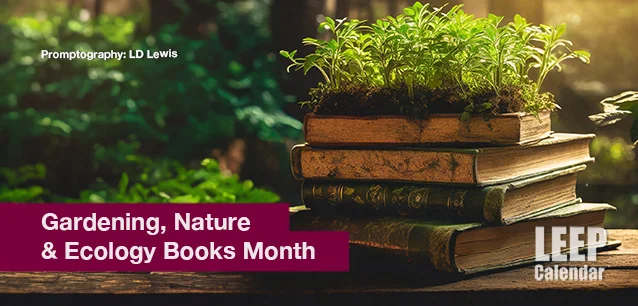 AD
AD
Today is: January 12
Scroll to explore events active on this date.
Additional Events on LEEP
LEEP INK FEATURES

August? Absolutely!
In August, we live through the Dog Days of Summer. It's hot and often humid, and those who can leave for better climates do. Down south, winter is in full force. August is also known as "the ...

In The Heat of July: July 2025 Events
Is it hot enough (or cold enough if you're below the equator) for you yet? There is actually a day for that! Like every month, I pick a diverse collection of events you may or may not know about. This ...

May Blooms: Events in May 2025
Along with October, May is one of the most densely packed months of the year. It's before the summer humidity and the last whole month of the school year. The weather is warming in t...
About Gardening, Nature and Ecology Books Month
Career , Books
Education , United States
Ends: Mar 31, 2024
DESCRIPTION:
Read to Grow Your Garden
Gardening, Nature, and Ecology Books Month, celebrated annually, promotes and appreciates literature that focuses on gardening, the natural world, and ecological issues. This observance typically highlights the importance of books in educating and inspiring individuals about the environment, sustainable gardening practices, and the conservation of natural resources.WHEN DO YOU PLANT? IT DEPENDS ON WHAT YOU'RE PLANTING
The best time of year to plant a garden varies depending on geographic location and the specific plants being grown. Generally, for most temperate regions:
Spring Planting: Late spring, after the last frost date, is ideal for planting most vegetables, flowers, and herbs. This period is favorable due to the warmer soil temperatures and increased daylight, which are conducive to plant growth.
Fall Planting: Autumn can be an excellent time for planting perennials, trees, and shrubs. The cooler temperatures and reduced sun intensity allow these plants to establish roots without the stress of summer heat.
Summer and Winter Planting: These seasons are generally less favorable for planting in most temperate climates. Summer's high heat can stress plants, and winter's cold can inhibit growth.
It's essential to consider the specific climate zone and local weather patterns. For example, in warmer regions, some vegetables and flowers may be planted in winter, while the planting season may be shorter in colder areas.
Gardening, Nature, and Ecology Books Month serves as a reminder of the wealth of knowledge available in books on these subjects. Libraries, bookstores, schools, and gardening clubs often participate in this observance by hosting book discussions, author talks, and educational workshops. This month is an opportunity for both seasoned and novice gardeners and nature enthusiasts to learn and share information about sustainable practices, the beauty of the natural world, and the importance of ecological balance.
VIDEOS
SUPPORTING DOCUMENTS
Currently, this event does not have supporting documents.
ADDITIONAL IMAGES
Currently, this event does not have supporting images.
Where would you like to go now?
 AD
AD


/footer-logo.svg)
